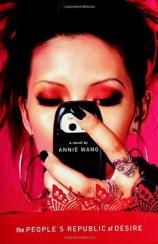Reading Group Guide
Discussion Questions
The People's Republic of Desire

1. Discuss your reaction to the novel: were you aware of the seismic shift in popular culture in the new modern China? What surprised you? What had you imagined life in contemporary China to be like? What does Annie Wang's novel illustrate about globalization?
2. To what extent did you feel that The People's Republic of Desire was a novel in which plot was secondary to social commentary?
3. Wang writes: "The young urban Chinese are finally catching up with the middle class life of the West....But does a higher standard of living make people better human beings?" Does it make them happier? How is this debate an integral part of the novel? What resonance does this question have for your own life?
4. How do you believe that China's 25-year-old one child policy -- "of being relieved...whether they like it or not, of endless motherhood"(CNN.com, 5/17/05) has influenced the women we encounter in Annie Wang's The People's Republic of Desire? Discuss how your life might be different if your family size was dictated by the government?
5. Annie Wang's name-dropping column in the South China Post (upon which this novel is based) served according to Wang (Financial Times, London 4/10/04) as a "fashion guide among some yuppies and yuppie-wanna-bes..." who would "go to the bars and cafes mentioned, carry the same purses and phones..." But her intent, unlike Sex and the City column which presented luxury brands and purposefully drove trends, was "making fun of these shallow things." But do you think that Wang should have been surprised that her chronicle of status-items would be taken as a shopping list? What part does she play in her readers' consumption?
6. What was Colorful Clouds' American dream? Did she achieve it? If you believe she did, was it "in the real world or in the world of her imagination?" (Page 93)
7. Why do you think Wang's narrator Niu Niu believes that many modern Chinese believe that it is crucial to fake their identity, origin, and accent? How does that compare with the American notion -- and popular theme in literature -- of reinvention?
8. What exports of American pop culture do you think have had the most negative influence on Niu Niu and the women of Beijing? How does life in modern China compare to life in a Western metropolis like New York, Los Angeles, and Miami? How does it differ?
9. Chapter 45/"A Prude or a Bitch" illustrates a debate in which several women speak to what television dramas they prefer: Japanese shows like Tokyo Love Stories, New York style romantic comedies like Sex and the City or Ally McBeal, or Korean soap operas. What do their favorite shows say about each woman and what they desire out of love and a relationship? What flaws do they each see in each other's favorite programs?
10. Niu Niu's friends muse that "nowadays, the world is for bad girls" how is Niu Niu's generation lost when it comes to trying to apply the values and lessons of their youth to their modern lives? Why do some believe that becoming a "single mother, a lesbian, or bi" would add to their personal marketability? What does Annie Wang seem to be saying about the state of personal morality in modern China?
11. Discuss some of the terms that appear in the "Popular Phrases" section that concluded the chapters of the novel -- especially "those flashy new words that have entered the Chinese vocabulary along with the opening up of the market economy -- such as cehua (page 113) and xiaozi (page 301). Did any particular phrases stand out to you?
The People's Republic of Desire
- Publication Date: April 4, 2006
- Paperback: 464 pages
- Publisher: Harper Paperbacks
- ISBN-10: 0060782773
- ISBN-13: 9780060782771







